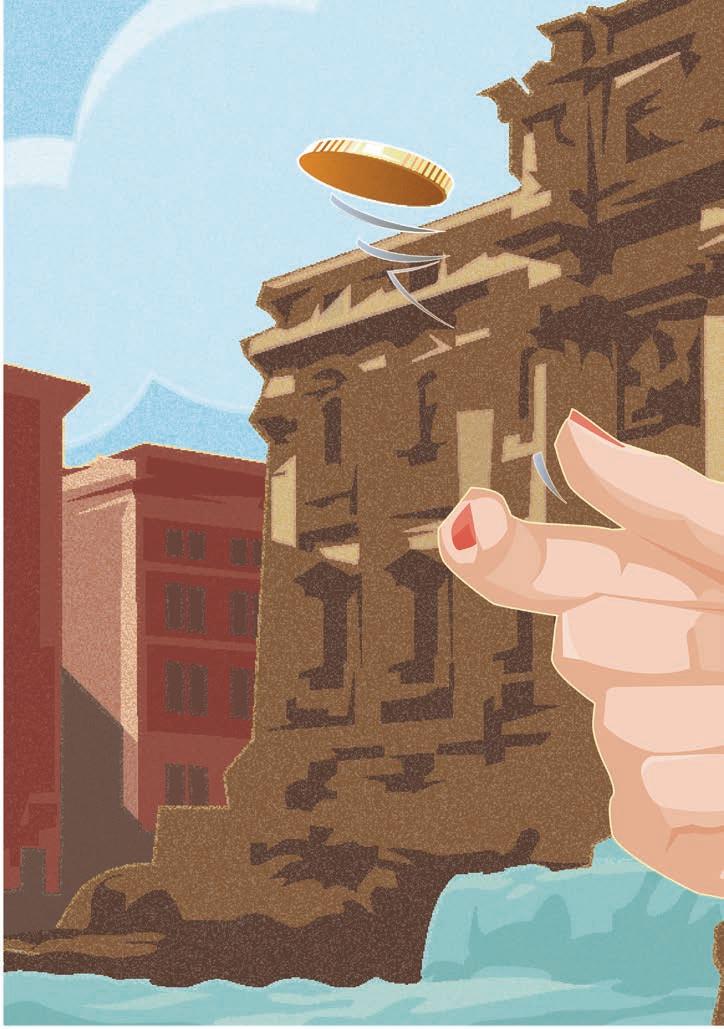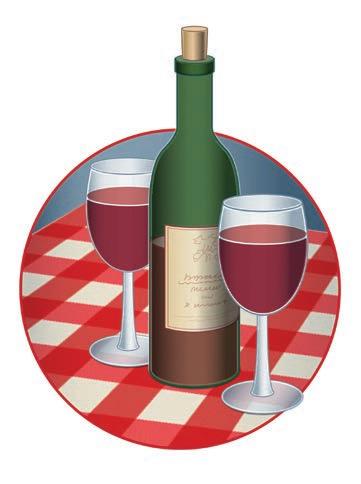
10 minute read
Into the New By Frances Mayes
A brave new world
E arlier t his year, in t he m idst of globa l lockdow ns, pa ndem ic f at ig ue a nd a n unpre ce dente d sense of loss, we a ske d t hre e Nor t h Carolina aut hors — Fr a nces Mayes, Et af R um a nd Da niel Wa l lace — to share t heir t a les of our br ave new, old world. Of fer ing glimpses of resi lience, hope, fear, t r a nsfor mat ion a nd what-ifs, each pie ce is a n ex plor at ion of f re e dom a nd t he myster y of t he huma n spir it.
Advertisement
Read on for one memoir and t wo work s of fiction that open our eyes, minds and hear ts through incomparable stor ytelling.
Into the New
By Fr a nce s M ay e s
Il lus t r at Ion By Ger ry o’neIl l
Dur ing the pandemic, I became enthralled with T he New York Times word game, the Spelling Bee. I’d never been attracted to crossword puz zles, Mensa quizzes or those already-penciled-in Sudok u squares in airline maga zines. I’d rather read a book. But there I was at midnight, spending good hours I should have used on my nascent novel, star ing at seven letters that must be ar ranged into words. At least I could excel at finding the pang ram — the word that uses all the letters.
W hat I couldn’t do at all was imag ine what my fictional characters Charlotte, L ee and A nnsley possibly could be up to in their imag ined world, g iven that a plag ue was loose in the real world. T heir concer ns seemed of no concer n.
But I was lear ning dozens of new words such as lambi, boba, libelee, doggo and r icin — words that proved useless outside of boosting me f rom “ama zing” stat us to “genius.” A h, genius. W hat an accomplishment, that is, until the next mor ning when the new puzzle appeared.
Many f r iends also had developed obsessive activities. My husband, E d, seemed always to be mowing the g rass, even measuring the height so it remained at 2 inches. My f r iend Susan tore through several Indian cookbook s, leaving containers of spicy food at our back door constantly, and an A ma zon tr uck pulled up daily at our across-the-street neighbor’s dr iveway. She was shop ping maniacally.
T hose of us who were luck y sur v ived that suspended and puzzling and f r ustrating siege. R emember w iping of f g rocer y bags on the porch? R emember when fashion mask s in silk pr ints appeared? R emember those annoy ing suggestions to keep a g ratit ude jour na l? For decades, we’ll be puzzling through this af ter math of g r ief, its ef fects on st udents, what ref usa l to believe the v ir us existed means, the inca lculable, stagger ing losses, the globa l politics, on and on. Per ora, for now, as the Ita lians a lways caution, we are reassessing, rea lizing that we are luck y to do the things we so took for g ranted.
Are we in a Brave New World?
By metabolic nature, I’m a traveler. Af ter having covered a lot of the globe and written many books about place, of course I knew that those journeys play a major par t in my life. During confinement, I chafed. I star ted spending hours researching the histor y of Cypr us, the accommodations at Machu Picchu, a hike f rom Bratislava to Prag ue.
Work ing on the Spelling Bee one week about eight months into house ar rest, I came to an impasse. Instead of for ming the usual words, I saw that I was pick ing the letters for “L ondon,” “Rome,” “Miami,” “Hawaii.” Not allowed, any place names, but my travel gene was tak ing over. I couldn’t get “bountif ul,” “exciting,” “texting” but adamantly t yped in “Par is,” “Kenya,” “Greece.”
Travel, it t ur ns out, isn’t just what I like to do, it’s who I am. Did others find such tr uths?
I pushed my novel to the back of my desk — bye-bye A nnsley, L ee, Charlotte — and began wr iting about home. W here’s home? W hy leave home? W hat happens when you do leave home? W hy do memor ies of var ious homes come back over and over in dreams? How do you make a home? T he pull of this subject, so unlike my novel, took over my days.
I quit pour ing that second, third glass of wine with dinner; I exercised; I lost t went y pounds. Despite all the activit y, the desire to go, just go, became over whelming. E d and I donned N95 mask s and traveled to our home in Italy. I felt like we held our breaths the entire way. We were allowed in because we have residency cards. Ever yone g reeted us like ret ur ning Olympic stars. We quarantined at our home, then lined up for enter ing the negozio di f r utta e verdura for g rocer ies, enjoyed our f r iends within the limits of our houses, har vested our olive crop, and, before ret ur ning to Nor th Carolina, spent t wo days in Rome pr ior to depar t ure.
Rome alone. I walk. A ll day. At night. Walk ing the soles of f my shoes. In this slowed, sur real scape, here’s Rome washed clean, the cit y showing its beaut y unalloyed. I revisit favor ites of mine, even though many are closed — Bramante’s Tempietto on the Janiculum Hill, the Baroque extravaganza Pala zzo Colonna, the chalk pastel pala zzi on Pia zza San L orenzo in L ucina, k iosk s of botanical pr ints and severe eng ravings of r uins at the Mercato delle Stampe, Gelater ia del Teatro for sublime gelato of lavender and white peach, or cher r y, or orange and mascar pone. W ho can choose?
At Trevi fountain, E d and I stand there alone. For the first time in decades, I toss a coin. In Pia zza Navona, too, I can hear the musical splash of water f rom the Four R ivers fountain and walk around the lovely ellipse of the ancient stadium. T he g reat Marcus Aurelius, copy of the second- cent ur y bronze r ider, atop his prancing horse at Michelangelo’s Pia zza del Campidoglio, gains in majest y as he sur veys a vacant pia zza. Totally real, Rome feels imag ined, conjured as one of Italo Calvino’s invisible cities. E er ie. T here’s a lone woman with red f r ight-wig hair wobbling along the sidewalk with a basket of oranges; the familiar aroma of dark cof fee waf ting out of a bar, where the bar ista stands polishing glasses for no customers. T he sk y is a color a watercolor ist might mi x, find it too milk y pale, and decide to stir in another dollop of cer ulean. Trajan’s Column seems to tilt against r ushing clouds. T he for um appears doubly ancient, columns white as bleached femurs. Church bells send out circles of silver sound. T he sculpt ural pines, the v ulgar magenta bougainvillea, the sur pr ise of palms.

Because Rome was still “yellow,” low-risk but cautious, some restaurants are open for lunch outside. We order both the f ried ar tichokes and the ar tichokes with tender homemade pasta. We’re talk ing about whether anything of this Rome can be carried for th into normal times. We remember the day we showed our grandson 18 fountains in one day. We remember that Keats rode a pony around the Piazza di Spagna in his last weeks. We remember an apar tment we rented with a roof garden that looked down on a clothesline with flapping giant underpants. T he waiter forgets our glasses of wine, apologizes, and brings over a whole bottle. (T hat’s Rome.) I’m thrilled to see Rome like this: an unforgettable, once in a lifetime experience for this traveler.
I hope never to see Rome like that again.
A f ter a day, I missed the scramble to see what’s on at the Quir ina le, new restaurants, f r iends toasting at w ine bars, shopping for shoes, track ing dow n 10 things on my to -see list. A ll this amid a chaos of sirens, hor ns, weav ing motorc ycles, tsunamis of tour ists, over flow ing garbage bins, buses spilling out g roups f rom a ll over the world, silly goofs tr y ing to get in the fountains. Life. People, annoying, glor ious people.

Back at home, the bleak holiday season ar r ived, then in Januar y, hallelujah: the vaccine. A quasi-nor mal life recommenced.
A m I g r atef u l for t h is p er io d of sol it ude, int ro sp e c t ion, fo c us? Not a bit. I’m g r atef u l t hat no one I love d ie d, t hat’s it. L et’s not wh itewa sh: t he p er io d wa s relent lessly aw f u l a nd a fl a sh of pa n ic wa shes over me when I wonder if it w i l l happ en aga in.
W hat remains? Is there no silver lining? Yes, the major takeaway: a heightened awareness of carpe diem, seize the day. I love so many people; have I said so enough? A ll the posts and emails showed f riends mak ing their level best of the situation. I saw anew their humor, resourcef ulness, brilliance, thoughtf ulness and determination. T hey signed of f not with “ciao,” or “xoxo,” but now with “L ove you,” “Miss you,” “A lways and Forever.” Don’t forget this, I told myself, when we’re back at Vin Rouge and JuJu, toasting and chatting and exchang ing plans, feeling invincible. We are not invincible. T he drastic happened. Don’t forget the lively crowds in Istanbul, the subway cr ush in New York, the swar ms reveling in the extreme beaut y of Cinque Ter re. Living their lives. Keep the table set, keep the antenna aler t for f r iends in need, keep work ing to k now what’s really going on, keep the rosé chilled, wr ite the check to someone r unning on ideals, say you are dear to me, order the flowers, the Georg ia peaches, the book I just read that X might enjoy. Oh, I do this, but now, my ef for t doubles and cubes.
Brave New World — we k now A ldous Hu xley’s depressing novel and his title has been used and used, ironically and ser iously. Maybe used up. He took the words f rom Shakespeare’s T he Tempest and the whole quote is now somewhat lost. T he last half of the sentence is best. Miranda speak s, “O brave new world, that has such people in it.” W hat mind-bending losses.
Memento vivere, remember to live. We go on now, together. You are dear to me.
I didn’t g ive up on the daily Spelling Bee but if I can’t be a quick genius, I click over to visit A nnsley, L ee and Charlotte. T hey’ve been waiting a long time to resume their lives. W hen last seen they were ar ising f rom the table af ter a dinner par t y, about to make enor mous changes. I think they are ready. SP Fran ce s May e s is a n o velist , p o et an d e ssayist kn o w n for w ork in clu ding th e New York Times be st sell er Under t he Tusc a n Sun. Sh e an d h er hu sban d split th eir t im e betw e en Nor th Carolin a an d It aly.
Her fav or it e bo ok is O ne Hundre d Ye ars of S ol it ude b y Gab r i el Garcí a Márqu ez.





